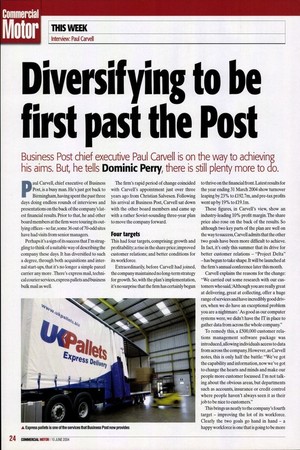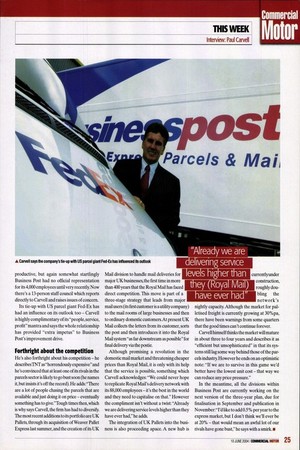Diversifying to be
Page 20

Page 21

If you've noticed an error in this article please click here to report it so we can fix it.
first past the Post
Business Post chief executive Paul Carvell is on the way to achieving
his aims. But, he tells Dominic Perry, there is still plenty more to do.
paul Carvell, chief executive of Business Post, is a busy man. He's just got back to Birmingham, having spent the past three days doing endless rounds of interviews and presentations on the back of the company's latest financial results. Prior to that, he and other board members at the firm were touring its outlying offices—so far, some 36 out of 70-odd sites have had visits from senior managers.
paul Carvell, chief executive of Business Post, is a busy man. He's just got back to Birmingham, having spent the past three days doing endless rounds of interviews and presentations on the back of the company's latest financial results. Prior to that, he and other board members at the firm were touring its outlying offices—so far, some 36 out of 70-odd sites have had visits from senior managers.
paul Carvell, chief executive of Business Post, is a busy man. He's just got back to Birmingham, having spent the past three days doing endless rounds of interviews and presentations on the back of the company's latest financial results. Prior to that, he and other board members at the firm were touring its outlying offices—so far, some 36 out of 70-odd sites have had visits from senior managers.
Perhaps it's a sign of its success that I'm struggling to think of a suitable way of describing the company these days. It has diversified to such a degree, through both acquisitions and internal start-ups, that it's no longer a simple parcel carrier any more .There's express mail, technical courier services, express pallets and business bulk mail as well.
The firm's rapid period of change coincided with Carvell's appointment just over three years ago from Christian Salvesen. Following his arrival at Business Post, Carvell sat down with the other board members and came up with a rather Soviet-sounding three-year plan to move the company forward.
Four targets
This had four targets, comprising: growth and profitability; a rise in the share price; improved customer relations; and better conditions for its workforce. Extraordinarily, before Carvell had joined, the company maintained no long-term strategy for growth. So, with the plan's implementation, it's no surprise that the firm has certainly begun
to thrive on the financial front. Latest results for the year ending 31 March 2004 show turnover leaping by 23% to £192.7m, and pre-tax profits went up by 19% to £19.1m.
These figures, in Carvell's view, show an industry-leading 10% profit margin. The share price also rose on the back of the results. So although two key parts of the plan are well on the way to success, Carvell admits that the other two goals have been more difficult to achieve. In fact, it's only this summer that its drive for better customer relations — "Project Delta" —has begun to take shape. It will be launched at the firm's annual conference later this month.
Carvell explains the reasons for the change: "We carried out some research with our customers who said,Although you are really great at delivering, great at collecting, offer a huge range of services and have incredibly good drivers, when we do have an exceptional problem you are a nightmare.' As good as our computer systems were, we didn't have the TT in place to gather data from across the whole company."
To remedy this, a £500,000 customer relations management software package was introduced, allowing individuals access to data from across the company. However, as Carvell notes, this is only half the battle: "We've got the capability and information, now we've got to change the hearts and minds and make our people more customer focussed. I'm not talking about the obvious areas, but departments such as accounts, insurance or credit control where people haven't always seen it as their job to be nice to customers." This brings us neatly to the company's fourth target — improving the lot of its workforce. Clearly the two goals go hand in hand — a happy workforce is one that is going to be more
productive, but again somewhat startlingly Business Post had no official representation for its 4,000 employees until very recently. Now there's a 13-person staff council which reports directly to Carvell and raises issues of concern.
Its tie-up with US parcel giant Fed-Ex has had an influence on its outlook too — Carvell is highly complimentary of its "people, service, profit" mantra and says the whole relationship has provided "extra impetus" to Business Post's improvement drive.
Forthright about the competition
He's also forthright about his competition — he describes TNT as "horrendously expensive" and he's convinced that at least one of its rivals in the parcels sector is likely to go bust soon (he names it, but insists it's off the record). He adds: "There are a lot of people chasing the parcels that are available and just doing it on price — eventually something has to give."Tough times then, which is why says Carvell, the firm has had to diversify. The most recent additions to its portfolio are UK Pallets, through its acquisition of Weaver Pallet Express last summer, and the creation of its UK
Mail division to handle mail deliveries for major UK businesses, the first time in more than 400 years that the Royal Mail has faced direct competition. This move is part of a three-stage strategy that leads from major mail users (its first customer is a utility company) to the mail rooms of large businesses and then to ordinary domestic customers. At present UK Mail collects the letters from its customer, sorts the post and then introduces it into the Royal Mail system "as far downstream as possible" for final delivery via the postie.
Mail division to handle mail deliveries for major UK businesses, the first time in more than 400 years that the Royal Mail has faced direct competition. This move is part of a three-stage strategy that leads from major mail users (its first customer is a utility company) to the mail rooms of large businesses and then to ordinary domestic customers. At present UK Mail collects the letters from its customer, sorts the post and then introduces it into the Royal Mail system "as far downstream as possible" for final delivery via the postie.
Mail division to handle mail deliveries for major UK businesses, the first time in more than 400 years that the Royal Mail has faced direct competition. This move is part of a three-stage strategy that leads from major mail users (its first customer is a utility company) to the mail rooms of large businesses and then to ordinary domestic customers. At present UK Mail collects the letters from its customer, sorts the post and then introduces it into the Royal Mail system "as far downstream as possible" for final delivery via the postie.
Mail division to handle mail deliveries for major UK businesses, the first time in more than 400 years that the Royal Mail has faced direct competition. This move is part of a three-stage strategy that leads from major mail users (its first customer is a utility company) to the mail rooms of large businesses and then to ordinary domestic customers. At present UK Mail collects the letters from its customer, sorts the post and then introduces it into the Royal Mail system "as far downstream as possible" for final delivery via the postie.
Although promising a revolution in the domestic mail market and threatening cheaper prices than Royal Mail, it is only with its help that the service is possible, something which Carvell acknowledges: "We could never hope to replicate Royal Mail's delivery network with its 88,000 employees — it's the best in the world and they need to capitalise on that." However the compliment isn't without a twist: "Already we are delivering service levels higher than they have ever had," he adds. The integration of UK Pallets into the business is also proceeding apace. A new hub is
currentlyunder construction, roughly doubling the network's nightly capacity. Although the market for palletised freight is currently growing at 30 %pa, there have been warnings from some quarters that the good times can't continue forever.
currentlyunder construction, roughly doubling the network's nightly capacity. Although the market for palletised freight is currently growing at 30 %pa, there have been warnings from some quarters that the good times can't continue forever.
currentlyunder construction, roughly doubling the network's nightly capacity. Although the market for palletised freight is currently growing at 30 %pa, there have been warnings from some quarters that the good times can't continue forever.
Carvell himself thinks the market will mature in about three to four years and describes it as "efficient but unsophisticated" in that its systems still lag some way behind those of the parcels industry. However he ends on an optimistic note: "If we are to survive in this game we'd better have the lowest unit cost — that way we can reduce any price pressure." In the meantime, all the divisions within Business Post are currently working on the next version of the three-year plan, due for finalisation in September and publication in November: "I'd like to add 0.5% per year to the express market, but I don't think we'll ever be at 20% — that would mean an awful lot of our rivals have gone bust," he says with a smirk. •
























































































































































































